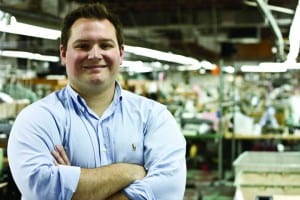
“A Better Way” says Venezuelan-American Ex-Sgt. Acosta
In late 2010, John Acosta, a 27-yearold Venezuelan-American sergeant in the U.S. Air Force, hit upon the idea for his Miami adaptive pajama top company when his family was plunged into the world of end-of-life caregiving.
Acosta’s grandfather, William Ronald Biggs, then 78, was losing a 12-year battle with Parkinson’s disease. The family physician made the difficult choice to initiate home hospice care.
Not so many years before, Biggs had been an advertising and PR powerhouse in his native Michigan, whose company board included lifelong friend and mentor NFL football coach George Allen and esteemed economist Paul McCracken. Biggs was an avid golfer and author of two popular books, dedicating the proceeds to scholarships. Now he was bedridden and helpless.
Acosta’s grandmother and Biggs’ wife of 57 years,- Ruth Ann, found herself the main caregiver, charged with keeping Acosta’s father clean, dignified and free of bedsores and other afflictions as he faced his final journey.
Dressing was, surprisingly, one of the most painful things. Changing a shirt was agony. Never one to complain, Biggs would endure the sharp pain, especially when his family members tried to dress or undress him with his arms stiffened from Parkinson’s.
John helped as he could, and his younger sister worked particularly hard. He was frustrated by the lack of products and resources to make life easier for both the caregiver and the patient.
“It struck me that there just had to be a better way,” Acosta said.
So Acosta hit upon his idea. Why not create tasteful sleepwear with soft, breatheable cotton that unbuttons in the front with snaps all up and down the sleeves? With an open back, dressing and undressing could become, as it were, a snap.
An estimated 1.4 million Americans participate in hospice care every year, and that number is only expected to grow. Add to that the number of paraplegics, quadriplegics and others permanently or even temporarily deprived of mobility. With open backs and quick snaps down the sleeves of the garments, caregivers can change clothes without avoidable lifting or removal of intravenous devices or monitoring systems, saving time and injury on hospital floors.
Soon thereafter, Acosta gave birth to his company: Comfort Care Clothing Co., lodged in a Hialeah factory and reached at www.comfortcareco.com.
Now 29, Acosta has since left the Air Force after eight years’ service, and is embarking on his journey as a Miami entrepreneur, as he and his wife are expecting their first baby.
The business is still in its early stages but maturing steadily, with Central American and Asian manufacturers ready to produce the adaptive pajama tops on demand. The garment lists for $35.99 and comes in blue for men and pink for women.
Demographics are on Acosta’s side. The population of those 85 and older has grown from just over 100,000 in 1900 to 5.5 million in 2010. The U.S. Census Bureau projects that population will more than triple to 19 million by 2050, when Acosta will be 66 and perhaps getting ready for retirement. By 2030, 20 percent of America will be 65 or over. By 2050, the American Health Care Association projects that 27 million people will use long-term health care services.
Acosta is convinced that he is onto something: “As the business grows, I look forward to expanding the offerings,” he says.
Comfort Care Clothing Co. investors have provided $150,000 in seed money. Those investors include: Gabor Marquez; Cesar Rodriguez; Mikel Aramburu, and Carlos and Enrique Gill. The group has extensive experience in financing and investing in businesses, which including food factories, art dealerships, broadcasting enterprises and the medical device industry, among other businesses.
For critical care nurse Audra Austin of Chicago, the adaptive clothing, particularly with the snap-on sleeves, comes at the right time.
“I have seen end-of life issues both as a caregiver of grandparents and as a critical care nurse,” says Ms. Austin. “As a society, we place so much emphasis on extending and preserving life, but the everyday and very real human concerns are often overlooked.
“Something as simple as the right kind of garment does more than ease back strain and cut workers’ comp claim for caregivers. It helps preserve the ideals of honor, dignity, and respect to individual patients and families both during their lives and when nearing the end of life.”
For John Acosta, it’s not just a business, but a mission: “There’s a sandwich generation out there of people in their 40s, 50s and early 60s. They are raising children and caring for parents.
“That trend is only going to continue for the coming decades. And it is a passion of mine to build a company founded on dignity for the patient and ease for the caregiver.
“As someone about to become a new father, I‘d like to create something that does my children and children of parents everywhere proud.”






